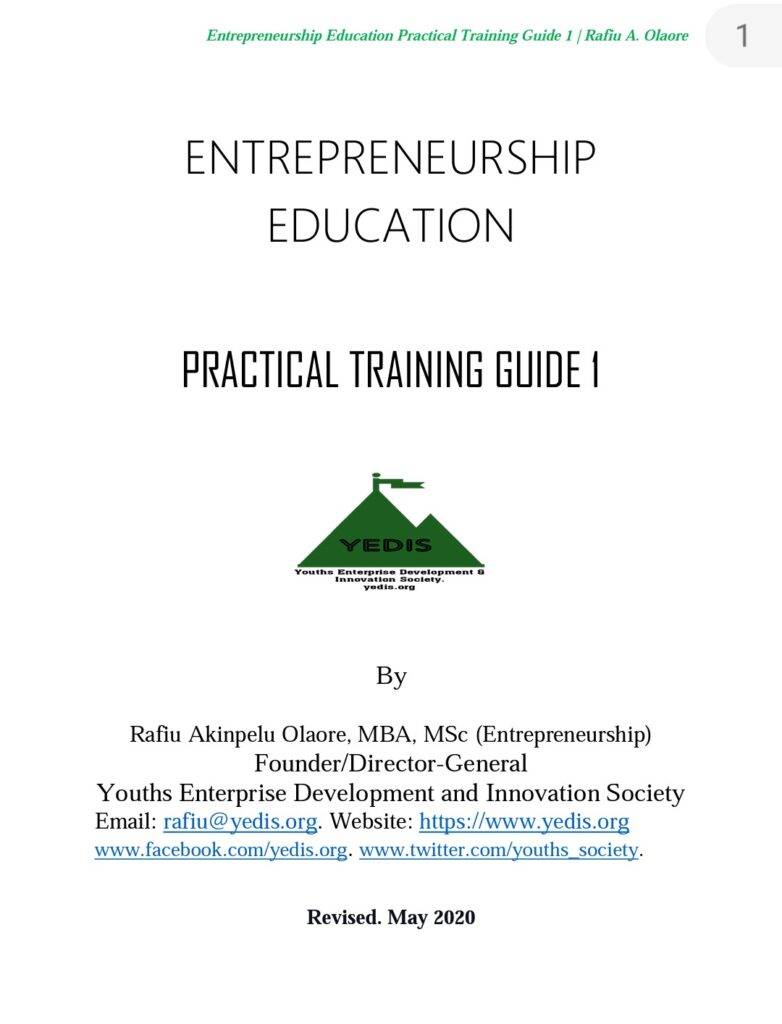INTRODUCTION
Entrepreneurship education aims to expose the youths, mostly young men and women, to alternative means of living. More so, to foster creativity, generate enterprise and innovative ideas, and develop an entrepreneurial mindset that will build up self-reliance and a better economy.
The consideration of entrepreneurial opportunities upholds the innovative and creative skills that exist at a very early age. There are pathways to entrepreneurial success, and they can achieve through creative thinking and regular practice, not by rote memorization.
Applying entrepreneurship education as a conditional subject/course of study for the academic program at every level gives education a fulfilling future. Entrepreneurship connects every academic discipline and answers the following: “Why do I need to study a profession?” Business administration, Engineering, Computer, Mathematics, Applied Science, Management, Agriculture, Environmental studies, Communication, history, geography, art, and so on. How will an artist turn the talent into a family-supporting career? How will a scientist convert a discovery into income? Every vocation and technical student with marketing skills should consider the difference between finding a job and doing their job. Youths should have the opportunity to make an informed decision about entrepreneurship as a career path. Creative young people and entrepreneurial thinkers can turn the unmet needs of the people into business opportunities and remain in their communities, generating employment and enlarging the national economy.
This Entrepreneurship education practical manual exposes students to varieties of trades and some principles required for the commencement. So, the youth should develop entrepreneurial culture as required by the Government Education Agencies in Nigeria and other nations.

Download full text here…..Download
Entrepreneurship education aims to expose the youths, mostly young men and women, to alternative means of living. More so, to foster creativity, generate enterprise and innovative ideas, and develop an entrepreneurial mindset that will build up self-reliance and a better economy.
The consideration of entrepreneurial opportunities upholds the innovative and creative skills that exist at a very early age. There are pathways to entrepreneurial success, and they can achieve through creative thinking and regular practice, not by rote memorization.
Applying entrepreneurship education as a conditional subject/course of study for the academic program at every level gives education a fulfilling future. Entrepreneurship connects every academic discipline and answers the following: “Why do I need to study a profession?” Business administration, Engineering, Computer, Mathematics, Applied Science, Management, Agriculture, Environmental studies, Communication, history, geography, art, and so on. How will an artist turn the talent into a family-supporting career? How will a scientist convert a discovery into income? Every vocation and technical student with marketing skills should consider the difference between finding a job and doing their job. Youths should have the opportunity to make an informed decision about entrepreneurship as a career path. Creative young people and entrepreneurial thinkers can turn the unmet needs of the people into business opportunities and remain in their communities, generating employment and enlarging the national economy.
This Entrepreneurship education practical manual exposes students to varieties of trades and some principles required for the commencement. So, the youth should develop entrepreneurial culture as required by the Government Education Agencies in Nigeria and other nations.

Download full text here…..Download

